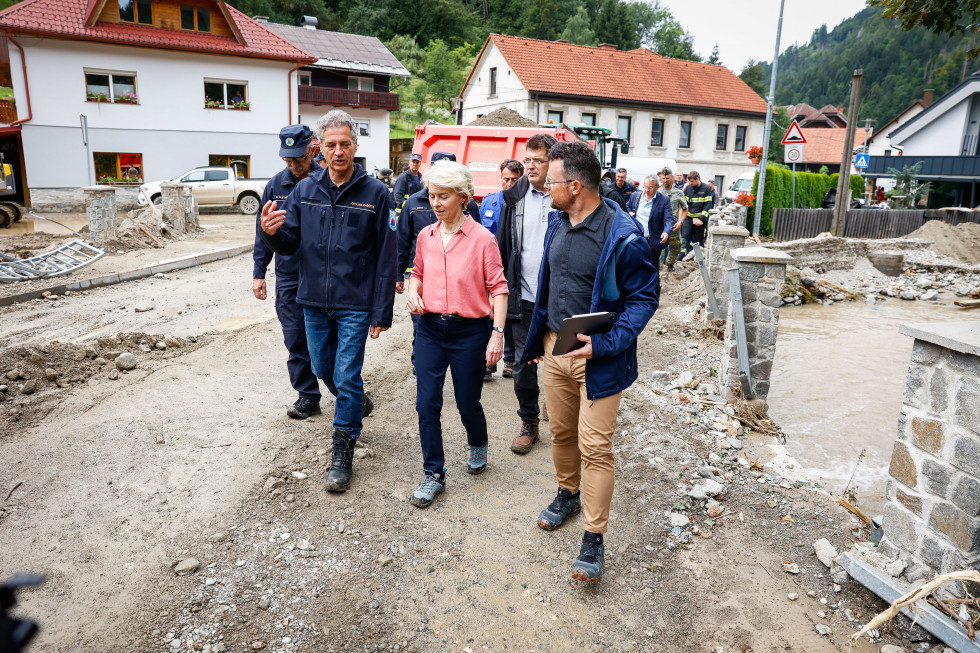EUR 400 million from the EU Solidarity Fund to help Slovenia cope with floods

Prime Minister Robert Golob and President of the European Commission Ursula von der Leyen visit to the flood-affected Črna na Koroškem. | Author Anže Malovrh, STA
The working visit of the delegations of the Government and the European Commission started with talks at Brdo pri Kranju, where the Prime Minister examined possible financial and other EU support for flood recovery and prevention. He thanked the European Commission for its assistance and coordination on the EU Civil Protection Mechanism and stressed that Slovenia needs additional assistance. The Government will apply for funding from the EU Solidarity Fund and ask for flexibility and constructive changes to existing or planned cohesion and agriculture funds and funds under the Recovery and Resilience Facility or NextGenerationEU. Prime Minister Golob expressed his expectation for flexibility in the assessment of state aid if a response of the Commission is needed and made it clear that this is a force majeure.
Following her talks with the Prime Minister at Brdo pri Kranju, the President of the Commission, accompanied by the European Commissioner for Crisis Management, Janez Lenarčič, visited some of the critical areas. The working visit was also attended by the Minister of Defence, Marjan Šarec, the Director-General of the Administration of the Republic of Slovenia for Civil Protection and Disaster Relief, Leon Behin, and the Commander of the Civil Protection of the Republic of Slovenia, Srečko Šestan. They flew by helicopter over Komenda, Mengeš, Kamnik, Luče, Ljubno ob Savinji and Mozirje. In Črna na Koroškem, they saw the consequences of the devastation on the ground.
"The President of the European Commission reacted quickly and came to Slovenia not only to express the support of the institutions, but also her personal support, sympathy and compassion for the Slovenian people, who are going through a difficult ordeal," said the Prime Minister. He added that in Črna na Koroškem they had met with the people and assured them and the representatives of the local community that they would not be alone: "And this is not only true for Črna, it is true for the whole of Slovenia, which has been affected." He said that he was aware of the budgetary constraints in the country and in Brussels, but that he assessed there would be enough funds to deal with the consequences of the natural disaster. "But we have to be efficient and rational in how we spend them. Above all, the money must reach those who are most affected, the people," he said.
In addition to the Government's message that no one will be forgotten and that aid will reach those affected quickly and efficiently, the Prime Minister also stressed the importance of EU membership: "The European Union is the best thing that could have happened to Slovenia and Europe in the last 100 years. When we needed help, we got it immediately. The same day we activated the rapid assistance mechanism, Slovenia started getting the help we asked for." This, he said, is the real solidarity that makes the EU great and is the reason why there is no alternative to it.
The President of the European Commission praised the outstanding response on the ground and from the Government. The European Commission will give Slovenia the maximum possible support. In addition to the support under EU Civil Protection Mechanism, the Commission will make accessible EUR 400 million from the EU Solidarity Fund to Slovenia in 2023 and 2024, of which EUR 100 million will be disbursed this year. The European Commission will also show maximum flexibility in the reprogramming of funds for programmes and projects requested by Slovenia, in particular cohesion funds. There is also funding available under NextGenerationEU (Recovery and Resilience Facility).
In the second part of the visit, the Prime Minister accompanied the President of the European Commission to the National Assembly, where she addressed deputies in an extraordinary plenary session. The agenda focused on solutions to manage such crises and to deal with their consequences in the future.

